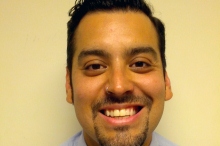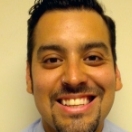
 Raul Garcia is being honored as a Champion of Change for his service to education.
Raul Garcia is being honored as a Champion of Change for his service to education.
I am deeply humbled and grateful for being named a Champion of Change. Teachers go to work every day to transform and inspire young people and I am so lucky to work with colleagues, families, and young people who drive my passion for the classroom with each waking morning. I genuinely believe that teaching is a calling and students know when their school community cares about them and works tirelessly to shape their minds and provide them with skills to survive the ever changing world around them. After 15 years of teaching in the Boston Public Schools I still wake up every day eager, and even giddy, to take on this challenge and calling.
The Boston Arts Academy, where I have worked for the past eleven years, has provided me with countless opportunities to become an innovative teacher, leader, and thinker in the classroom. As a small pilot school we have been afforded the luxury of having certain autonomies which allow teachers and leaders in our school to design curricula and staff that meet the needs of students and the greater mission of our school. One of those autonomies is the freedom to develop innovative curricula, while still adhering to state standards. This has allowed my colleagues and I in the Humanities Team to build a curricula over the past 15 years that is constantly shifting to meet our student population’s needs and to insure that we, as a team, refresh and raise our own standards every year. Whether we are revamping our literature schema or strengthening our Open Honors program the process is always empowering since all decisions are both collaborative and completely engaged through rich dialogue. Teaching at the Boston Arts Academy represents a team of educators committed to providing a rigorous arts and academic education for our urban students through a thoughtful and open process that we model all year for our kids.
While at B.A.A. I have also redesigned the 10th grade writing team’s curricula along with another group of colleagues in order to address student interests with regards to literacy, while also providing a rigorous writing program that prepares students for the state exam. This has been a wonderful design process for the last decade because with each year we have to reconsider ELL needs, Special Education needs, and even shifting race, class, and gender demographics in order to fit the most appropriate and challenging program for our students. With each year, and even student grouping, we find ourselves selecting novels, short stories, poems or even reading and writing skills to meet the specific needs of our students. Inspiring and motivating students is a constant moving ship and our teachers understand that if we are to be successful with our kids we must ask hard questions, think deeply about who our students are, and design, every day, curricula that is both demanding and exciting. Our job is to make our students love to read and write, not to just teach reading and writing. Teaching this to young adults is a labor of love because we are responsible for developing life-long readers and writers and this task is not taken lightly by my team.
In recent years I have also revived the National Honors Society at our campus and created a culture of service that has spread our work from the streets of Boston to as far away as the Grand Canyon. As a teacher it was always a goal of mine to have students understand the power of service and working in the communities that surround them. During my leadership of N.H.S. we required students to create their own community service plan outside of the school in Boston’s different neighborhoods, innovating unique fundraising strategies, and to save every year to travel to different states in order to serve their fellow Americans in need. Whether engaged in conservation work in Arizona, rebuilding after Hurricane Katrina, or assisting teams in Chicago’s urban gardens, students all learned that they are part of a much greater society than they ever imagined. Seeing students return home from their service trips is always a great joy of mine because, unlike the classroom, you have the unique opportunity of watching them “try on” their ideas in the real world. Being able to develop a sense of responsibility to their country in our urban youth is absolutely critical and a deep passion of mine that I relish each school year.
Again, B.A.A. has created a school environment that has empowered me as an educator and member of Boston’s many communities. When I walk to work every day I see and feel my responsibility to my students each day. I am very proud of the work we have done at the Arts Academy and I am confident that our students are making our country a better society because of the education they receive every day from us.
Raul Garcia teaches Writing and Humanities at the Boston Arts Academy


